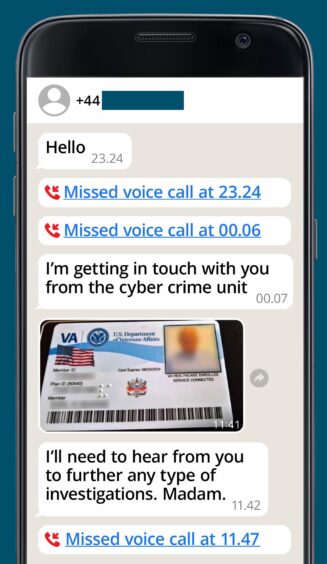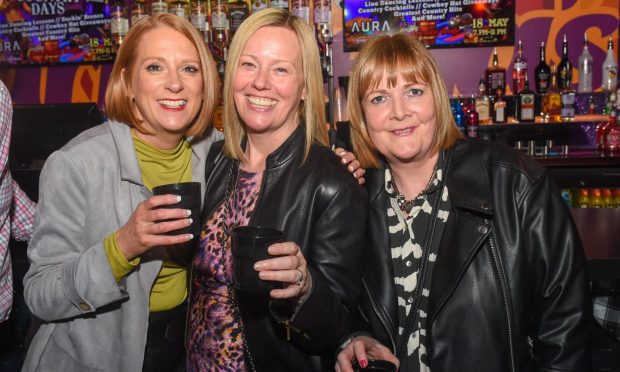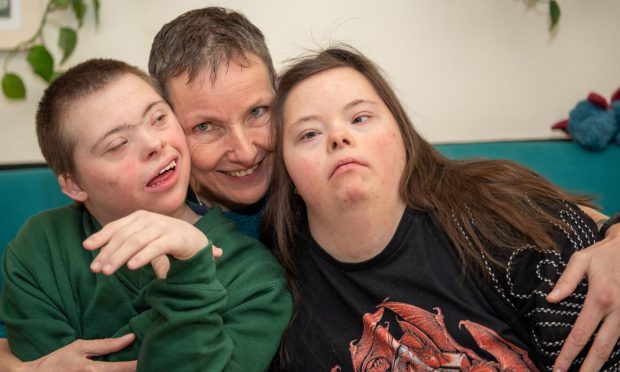When Lisa picked up her husband’s phone one January day, she had “absolutely no idea” that her life was about to change.
Offshore worker Phil was outside when the phone pinged and, knowing he was waiting for flight check-in details, she picked it up to look for him.
What she saw brought their lives crashing down.
On the screen was a message to her husband of 20 years from another woman – an American called “Evelyn”.
She discovered a string of messages between the two and it quickly became clear they were having an affair.
Lisa – whose name we have changed to protect her identity – blocked the number and confronted her husband.
He told Lisa it started when he was offshore and feeling lonely while away – however it continued when he returned home.
But when the story began to unravel, it became clear Lisa was not the only person who had been deceived.
Investigations revealed “Evelyn” was actually someone living in Ghana – who had successfully scammed them out of £10,000.
£10k missing from joint account
“Evelyn” had first reached out to Phil through LinkedIn and the pair started talking on another app.
Although Lisa doesn’t know when exactly the affair started, she discovered Phil, who was 60 at the time, had been sending money to three different PayPal accounts since September 2021.
That money had come from their joint account – set up by Phil – which included Lisa’s inheritance.
He sent “Evelyn” money to help her sick mum who needed medication, lawyer fees, and even a ticket to fly to Scotland so they could start their new life together.
“We’d been together 20 years – I had no reason not to trust him with my money,” Lisa said.
Once Lisa realised her husband had fallen victim to a romance scam she pushed him to report everything – but he refused, which Lisa believes was down to embarrassment.
Because the money was in a joint account, and the PayPal account used to send the money was in her husband’s name, Lisa felt she couldn’t report it herself and all she could do was encourage Phil to.
Scammers turn attention to Lisa
“Evelyn” attempted to blackmail Phil for some time, threatening to share pictures and texts. When he stopped sending money, they started messaging Lisa.
She believes they managed to hack his phonebook by sending links to videos.
“It’s incredible what they do really,” she said. “They hacked his phonebook, so they got my contact details and started coming after me telling me he was money laundering and was involved in terrorist activity and things.
“Because I knew who they were it didn’t bother me what they were saying to me – it was annoying, but it didn’t bother me.
“But, they could have quite easily been doing that to someone who was terrified and paying up.”
Phil declined to comment when contacted by The P&J.
Hopes her story will ‘stop it happening to someone else’
Lisa and her husband separated, and she left her Aberdeenshire home to move closer to her family in the Central Belt. Her beloved horses were sent to a sanctuary and she “lost everything” apart from her children.
She admits she thought romance scams were a thing of the past or something only young teenage boys fell for.
But, since last year she has been speaking to others who have fallen victim – keen to raise awareness and protect others.
She has learned the scams have become more sophisticated with technology, and even the photos of “Evelyn” were of an American model called Dani Daniels – who is frequently used by fraudsters.
“I literally lost everything,” she said. “I had to walk out, I had to leave.
“After what I’ve been put through, I’m determined something good has got to come out of this.
“I want to be able to say to myself ‘I did what I could to stop it happening to someone else’.
“As far as I’m concerned, he was a willing victim, he was on dating sites as well so he set himself up to have an affair.
“But, I appreciate that probably most of the people who are conned are innocent parties that are just looking for some company or someone to be nice to them.”
Police: ‘There are consistent warning signs to look out for’
Chief Inspector Steven McKinnon warned romance fraud is becoming more “sophisticated” and is often unreported due to feelings of embarrassment or shame.
He said: “Romance fraudsters will often target their victims through social media platforms or dating sites and will create a detailed fake persona to appear genuine and to appeal directly to their victims.
“The criminals behind romance frauds will invest months of effort to gain the trust of their victims, convincing them that they are in a real relationship before eventually appealing for money, goods, or banking details.
“Romance frauds are becoming more sophisticated and the criminals behind them will have a plausible answer when challenged but there are consistent warning signs to look out for – if they declare strong feelings after only a few conversations; if they suggest moving the communication to a different platform; or if they refuse to video call or meet you in person and offer excuses that their phone or camera isn’t working.
“If something doesn’t feel right, take time out to reflect and talk it over with a friend or family member.”
If you have concerns about someone you or a loved one have met online, help is available by contacting police on 101 or online.
You can also contact Action Fraud and speak to Citizens Advice Scotland. If you have any information about those behind romance and dating scams, you can also report them anonymously to Crimestoppers.
On the Beat: Don’t let scammers tug your heartstrings to get at your purse strings














